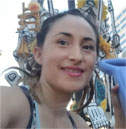Graduate Colloquium Series: Selene Diaz (SOCI) 10/1/19
“The Effects of Internal Migration on the Raramuri (Indigenous Community)” Tuesday, October 1, 2019, 4-5 p.m. Location: 311 Glasscock Building Selene Diaz Ph.D. candidate| Department of Sociology, 2019-2020 Glasscock Graduate Research Fellow Abstract: The Raramuris migrated to Ciudad Juárez, Mexico, in 1990s. They have had to migrate to urban places to look for opportunities to […]

“The Effects of Internal Migration on the Raramuri (Indigenous Community)”
Tuesday, October 1, 2019, 4-5 p.m.
Location: 311 Glasscock Building
Selene Diaz
Ph.D. candidate| Department of Sociology, 2019-2020 Glasscock Graduate Research Fellow
Abstract:
The Raramuris migrated to Ciudad Juárez, Mexico, in 1990s. They have had to migrate to urban places to look for opportunities to survive the degradation of their native land. The research objectives are: Examine how symbolic (ideas, stereotypes) and social (institutions, government projects) boundaries shape unequal access to social and economic opportunities for the Raramuri community. I will look at how migration has re/shaped their identities. To do this, I will explore processes of social interaction. To explore whether symbolic and social boundaries drive Raramuris to partake in hidden transcripts (strategies of resistance to domination) used in the original communities (Levy 1999). These objectives will be examined through feminist ethnography using participant-observation and semi-structured interviews.
The Graduate Colloquium offers graduate students an opportunity to discuss a work-in-progress with faculty and graduate students from different disciplines. By long-standing practice, colloquium presenters provide a draft of their current research, which is made available to members of the Glasscock Center listserv. Each colloquium begins with the presenter’s short (10-15 minute) exposition of the project, after which the floor is open for comments and queries. The format is by design informal, conversational, and interdisciplinary.
The Glasscock Center extends a warm invitation to faculty and students to join in a discussion of Selene’s work-in-progress. The paper is available to members of the Center’s listserv, or by contacting the Glasscock Center by phone at (979) 845-8328 or by e-mail at glasscock@tamu.edu.
Join the Center’s listserv to receive regular notices of colloquium events.
